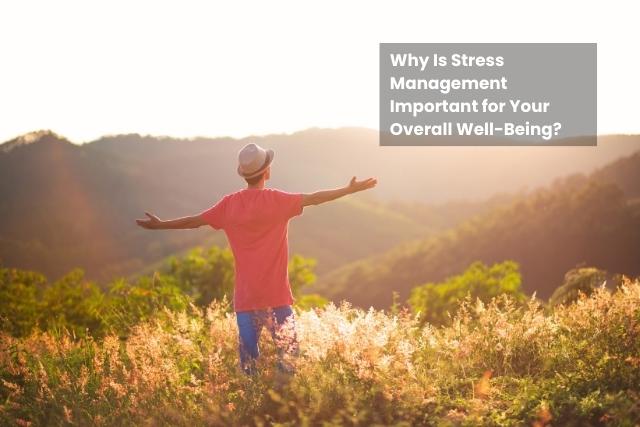Introduction:
In today's fast-paced world, stress has become an ever-present companion in our lives. From the pressures of work and personal responsibilities to the constant stream of information and stimuli, stress has a profound impact on our overall well-being. It's not just a fleeting discomfort; chronic stress can erode our physical health, emotional stability, and cognitive functioning.
Understanding the importance of stress management is crucial for maintaining a healthy and balanced life. Stress, if left unchecked, can lead to a myriad of health issues, including heart disease, depression, and weakened immune function. Moreover, it can strain relationships, hinder productivity, and diminish the quality of our daily experiences.
Therefore, this article will delve into the critical aspects of stress management, exploring effective techniques and strategies to cope with and reduce stress. By the end, you'll gain insights into why managing stress is not merely a luxury but a necessity for your overall well-being.
- Health Implications of Unmanaged Stress
- Emotional and Mental Well-Being
- Cognitive Function and Performance
- Relationships and Social Impact
- Effective Stress Management Techniques
- Holistic Well-Being and Life Balance
Health Implications of Unmanaged Stress:
Unmanaged stress takes a toll on your physical health. The body's stress response, designed to cope with immediate threats, becomes harmful when triggered constantly.
Chronic stress contributes to high blood pressure, weakened immune system, and increased risk of heart disease. It can disrupt sleep patterns, leading to insomnia and fatigue. Moreover, unmanaged stress can exacerbate existing health conditions, making it imperative to address overall well-being.
Emotional and Mental Well-Being:
Stress doesn't just affect the body; it deeply impacts emotions and mental health. Prolonged stress can lead to anxiety and depression, hindering your ability to enjoy life. It heightens emotional reactivity, making it challenging to cope with everyday challenges.
Managing stress is vital for emotional stability; it promotes a positive outlook, enhances resilience, and fosters emotional intelligence. By learning to manage stress, you empower yourself to navigate life's ups and downs with grace and composure.
Cognitive Function and Performance:
Stress significantly influences cognitive functions such as memory, attention, and decision-making. Chronic stress impairs these abilities, affecting academic or work performance. It hampers creativity and problem-solving skills, diminishing overall productivity.
Managing stress optimizes cognitive functions. When stress is under control, mental clarity improves, leading to better focus, enhanced learning, and efficient decision-making. This, in turn, enhances overall performance in academic, professional, and personal spheres.
Relationships and Social Impact:
Unmanaged stress can strain relationships. Irritability and mood swings, common side effects of stress, can create conflicts and misunderstandings. Stress may cause individuals to withdraw, impacting communication and intimacy.
Over time, these issues can damage relationships irreparably. Effective stress management, on the other hand, nurtures healthier relationships. It promotes patience, empathy, and understanding, essential elements for strong interpersonal bonds.
By managing stress, you create a positive environment that fosters meaningful connections and enriches social interactions.
Effective Stress Management Techniques:
Understanding stress management techniques is crucial for overall well-being. Techniques such as deep breathing, meditation, exercise, and time management help mitigate stress. Relaxation techniques like yoga and mindfulness promote a sense of calm and emotional balance.
Seeking social support, and talking to friends or a therapist, can provide valuable perspectives. Additionally, hobbies, creative pursuits, and spending time in nature act as effective stress relievers. Identifying and incorporating these techniques into daily life empowers individuals to confront stressors, enhancing resilience and emotional well-being.
Holistic Well-Being and Life Balance:
Holistic well-being involves addressing physical, emotional, mental, and social aspects of life. Stress management is at the core of achieving this balance. By managing stress effectively, you nurture holistic well-being.
It enables you to engage in self-care routines, prioritize mental health, maintain fulfilling relationships, and pursue passions and interests. Achieving life balance requires understanding the interconnectedness of these aspects and actively managing stress to maintain equilibrium.
A balanced life leads to overall contentment, increased life satisfaction, and a greater sense of purpose, contributing significantly to your overall well-being and quality of life.
Conclusion:
I hope this exploration of stress management has illuminated its paramount importance for your overall well-being. In conclusion, managing stress isn't merely a lifestyle choice; it's a fundamental necessity.
By addressing the health implications of unmanaged stress, nurturing emotional and mental well-being, optimizing cognitive function, and fostering positive relationships, you pave the way for a healthier, happier life. Embracing effective stress management techniques empowers you to navigate life's challenges with resilience and grace.
Ultimately, holistic well-being and life balance are achievable through mindful stress management. It's about more than just alleviating tension; it's about reclaiming control over your life, enhancing your relationships, and nurturing your mental and emotional health.
By making stress management a priority, you invest in your long-term happiness and fulfillment. Remember, in the face of life's inevitable stressors, your ability to manage stress can be the key to unlocking a life of vitality, purpose, and enduring well-being.








0 Comments